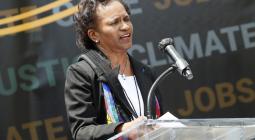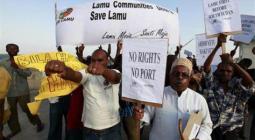'Simply remembering is not enough'

Typhoon Haiyan survivors demand climate justice ten years on
As global negotiations on loss and damage concluded their final meeting before COP28, those left behind from the Philippines’ deadliest storm push for the world’s biggest polluters to pay for their role in the climate crisis.
Jericho Aliposa, 35 years old, just graduated from college in the Philippine capital of Manila when one of the most powerful typhoons in modern history smashed into his hometown of Tacloban in the province of Leyte in 2013.
Before tragedy struck, he remembered being eager to escape from the fast-paced and traffic-clogged city life to the less polluted and biodiversity-rich environment of the province.
All his hopes came crashing down when Typhoon Haiyan made landfall in the Philippines on 8 November, affecting more than 16 million people, leaving a quarter of them homeless in provinces mostly in the Visayas region. The Philippines government confirmed 6,300 dead and over 1,000 still missing, as of its updated records in 2014.
Ten years later, Aliposa says there are minimal improvements in his town.
He has seen how coastal communities that were most affected by the super typhoon were relocated to the northern part of the province, further away from storm surges. But because of its distance from the city, locals have difficulty finding transportation and suffer from a water shortage.
Barangays or villages are better equipped in terms of climate mitigation, with early warning systems, mass text messaging technology, and locals more responsive to follow evacuation orders during storms, but climate resiliency is not as promoted as much as it should be, he says.
Together with grassroots community leaders, he formed a group that advocates against infrastructure that threatens mangroves and marine life in Tacloban – his own way of helping rebuild the town. But to really move the needle, the government must push for climate justice on behalf of the people, he says.
“It’s not enough to remember. Remembering should come with vigilance to make sure this does not happen again,” he says. “[As it is] the government is trying to wring itself from the blood of their neglect.”
The anniversary of Haiyan comes a few weeks before the 28th session of the Conference of Parties (COP28) climate talks to be held in 30 November in Dubai.
The high stakes conference is expected to finalise a proposal for a new climate disaster fund that would help climate vulnerable countries like the Philippines recover from the effects of extreme weather.
Earlier this month, negotiators agreed for the World Bank to be the host of the fund and encourage, not oblige, all countries to contribute to it. But it has yet to determine who will pay, who will benefit and how it will be governed.
The projected economic cost for loss and damage by 2030 alone has been estimated to be between US$290 billion and US$580 billion in developing countries alone. By 2050 the economic cost for loss and damage in developing countries is estimated to be between US$1 trillion to US$1.8 trillion.
On the home front, the Philippines’ Commission on Human Rights (CHR) last year released a report on the world’s first national enquiry on climate change, revealing that there are legal grounds to hold climate-destroying corporations liable for climate disasters.
The report concluded a four-year investigation by the CHR with a landmark resolution that 47 fossil fuel companies, including energy giants Shell, Chevron, ExxonMobil, Total, and BP, contributed to 21.4 per cent of global emissions.
The enquiry was propelled by a petition filed in 2015 by typhoon Haiyan survivors for the Commission to investigate the role that fossil fuel firms played in contributing to natural disasters.
The decision could have been used by the government to prioritise climate and environmental justice, Greenpeace earlier said, as the ruling came three days before President Ferdinand Marcos, Jr took office.
During Haiyan’s anniversary rites in Tacloban, Marcos Jr delivered a speech, where he noted how the true scope of loss is still unknown which is why "we grieve and we mourn”.
Jefferson Chua, a Greenpeace campaigner, said while this is true, the government must also recognise that an “unimaginable burden is being put squarely on the shoulders of vulnerable communities”.
“If our government is truly prioritising climate justice, then it must first place accountability on those responsible for the climate crisis—the oil and gas companies who continue to profit from their dirty business,” he said.









